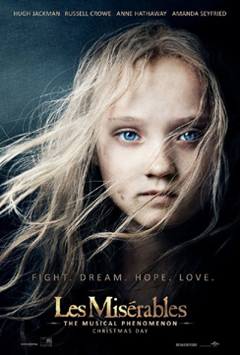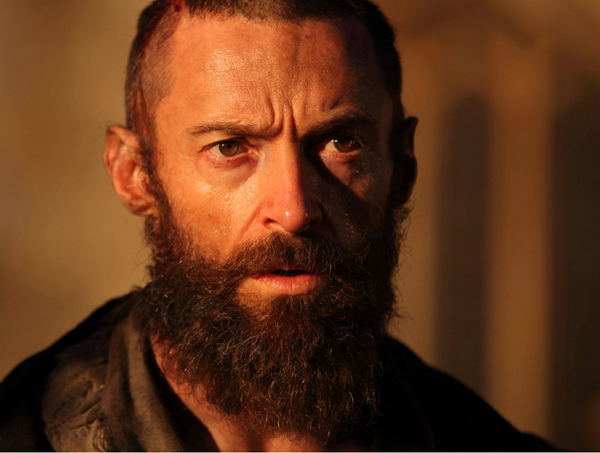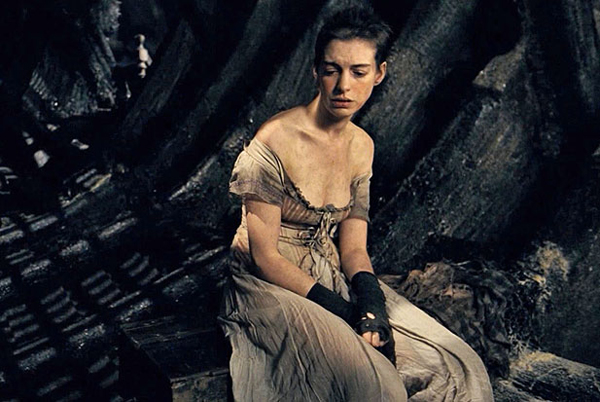Review – Les Misérables
|
Like a riverboat gambler suddenly flush with house money, director Tom Hooper decided to follow up his Academy Award winning film The King’s Speech with a big budget, star studded adaptation of Les Misérables that features live performances from his actors.
Typically, Hollywood adaptations of musicals have their stars prerecord their vocals before shooting. That way, they can playback the audio and have the actors lip sync to it, ensuring that the vocal track matches take after take no matter what angle the director shoots them from.
Hooper forgoes this process, choosing instead to let his actors sing their songs live on set. In theory, this allows them to have more authentic performances with the types of subtle nuances and variations that the audience would hear seeing a live stage performance of Les Misérables. The tradeoff though is that, to make it work, Hooper locked himself into using a singular sustained camera shot for the duration of his musical numbers. As a result, the audience gets a lot of tight closeups of the singers’ faces and a lot of otherwise oddly framed sequences.
Hooper’s approach facilitates what is easily the best scene in the film – Anne Hathaway’s stirring rendition of “I Dreamed A Dream.” Hathway plays Fantine, a single mother trying desperately to provide for her daughter, who loses her job and is forced to do a quickly escalating series of awful things in order to provide for her child. When she sings “I Dreamed a Dream,” she is utterly broken. It’s a desperate cry for help to a seemingly absentee God who has allowed this to happen, as well as one final grasp at the hope that there is a better world out there somewhere.
Hathaway is seated on the ground, the camera tightly focused on her face. She is a wreck as the notes pour out of her. Tears stream down her faces. Her voice quivers and breaks as she struggles to get the words out of her mouth. It feels so raw and intimate and utterly heartbreaking. And it is the type of moment that would have been much more difficult to create with a prerecorded vocal track that locked Hathaway into matching the precise way she sang the song in a studio weeks before shooting.
Unfortunately, as powerful as that one scene is, the rest of the film suffers for Hooper’s decision. What works so well in Hathaway’s scene handicaps other musical numbers, keeping certain performers from sounding confident and others looking awkward as the camera hangs tightly on them and they have nowhere to maneuver to.
The film is an adaptation of a musical version of a classic French novel written by Victor Hugo in 1862. It centers around Jean Valjean (Hugh Jackman), a man imprisoned for stealing a loaf of bread to feed his sister’s family. As he is paroled from prison after 19 years, a snarling policeman named Javert (Russell Crowe) warns him to keep his head down or he’ll end up back behind bars.
An emaciated, desperate Valjean is captured by police again after stealing silver from the kindly bishop (Colm Wilkinson) who gave him food and shelter. The bishop tells the police that he gave the silver to Valjean, freeing him from the charges. It is then that Valjean has a “road to Damascus” moment that convinces him to renounce his name and his past and to focus on doing good works in the present. Unfortunately, he skips parole to do this, making him a wanted man.
Within six years, Valjean reinvents himself as Monsieur Madeleine, a powerful factory owner and the mayor of Montreuil-sur-Mer. Things are going well until Javert rolls into town and recognizes Valjean, though he can’t quite place where he knows him from. While Valjean is distracted with Javert, one of his factory workers, Fantine, ends up getting fired after being harassed by her fellow employees, then blamed for the altercation. This leads to her tragic turn of events that spirals her life out of control and builds to Hathaway’s wonderful version of “I Dreamed a Dream.”
By the time Valjean realizes what has happened to Fantine, it’s too late to save her. But he vows to protect her daughter Cosette (played first by Isabelle Allen, then later by Amanda Seyfried) and to ensure Cosette has a good life. Unfortunately, Vajean does this after publicly admitting who he is in order to save another man that the authorities mistakenly believed was Valjean. He is forced to go on the run with Cosette in order to keep his promise to Fantine, while Javert pursues him. All of this unfolds while around Valjean the unrest of other citizens begins building to the infamous June Rebellion of 1832.
The film has a substantial amount of plot to get through in its 157-minute run time. Many of the key plot elements and character’s emotions are established through a quick song. This makes Hooper’s approach all the more problematic. When the songs fall flat vocally or don’t seem dynamic due to a limit range of camera movement, it effects the overall film drastically.
Russell Crowe suffers the most. As Javert, Crowe stands out as the weakest singer in the cast. Worst of all, he seems unsure of himself. There is hesitation in his vocals, which is at odds with his character, who is supposed to be an unrelenting figure of authority. Perhaps prerecording Crowe’s songs would have given him more confidence and led to better performances from him. Instead, up there live in front of the camera, he seems like a nervous newbie sweating bullets on opening night.
Jackman, at times, struggles with his songs as well. While he has real Broadway chops and overall is a lovely singer, some of the music in Les Misérables seems at the edge of his vocal range. And Seyfried’s voice can occasionally be cloying and overly Disney princess-esque. It’s hard to say exactly how much they would have benefited from prerecorded vocals, but it certainly wouldn’t have hurt.
In addition to the musical numbers, the film as a whole just seems bland and unambitious. Save an impressive opening sequence that begins underwater, then pans out to a mass of prisoners performing grueling manual labor, the film is rather dull aesthetically. To match the depressing tone, Hooper and his cinematographer give the entire film a dark, washed out look, which comes across more as boring than depressing. The battle sequences are choppy and poorly edited. There’s no real visual style or flair. (The exception to this are Sasha Baron Cohen and Helena Bonham Carter, who play two flamboyant shopkeepers who seem to exist in another movie entirely.)
There are moments when the film transcends its limitations and becomes quite enjoyable. Hathaway and Jackman (who both lost a significant amount of weight for their roles) both give inspired performances. And even though I left the theater feeling underwhelmed, I still found myself humming along to various songs from the production afterwards.
There are a variety of other versions of Les Misérables that have come out over the years. So while this version features a strong cast and a few brief moments of greatness, you are better off seeking one of them out on Netflix than rushing out to see this flawed version.
Written by Joel Murphy. If you enjoy his reviews, he also writes a weekly pop culture column called Murphy’s Law, which you can find here. You can contact Joel at murphyslaw@hobotrashcan.com.




